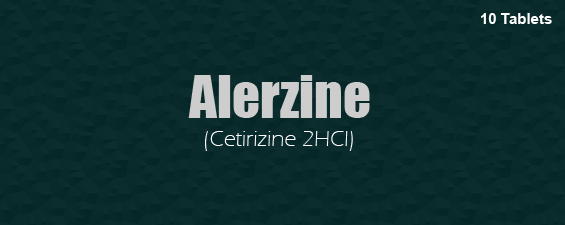- Alerzine Tablets contains
Cetirizine di-hydrochloride 10mg - Alerzine Syrup contains
Cetirizine di-hydrochloride 5mg/5ml
What is Alerzine use for?
Alerzine is a basic treatment of seasonal allergic rhinitis and conjunctivitis, perennial allergic, pruritus and urticarial of allergic origin.
How Alerzine Works?
As an Anti-allergic agent, in experimental animals, Alerzine exhibits an anti-H1 activity without any significant anticholinergic and anti-serotonin effects. At pharmacologically active doses, Alerzine induces neither sedation nor behavioral modifications. Alerzine exhibits a powerful and lasting antagonistic effect particularly selective at the level of the H1-receptors. In human pharmacology, its peripheral activity is demonstrated by the clearly significant inhibition of;
- The immediate wheal and flare reaction induced by intracutaneous injection of histamine.
- The endogenous histamine released in vivo as a result of stimulation by 48/80.
- The immediate allergic skin reaction triggered by an intracutaneous injection of pollen.
- The edematous skin reaction induced by substance P or VIP, (vasoactive intestinal polypeptide).
- The immediate allergic nasal reaction triggered by instillation of an allergen.
Alerzine substantially reduces the asthmatic patient’s bronchial hyper reactivity to histamine. It specifically opposes the migration of eosinophils induced in atopic subjects. These effects are achieved without any central effect being objectively demonstrated neither by psychometric tests nor by quantified EEG.
Peak Plasma Concentration and Half-Life
An intake of one Alerzine Tablet produces a blood peak of about 0.3µg/ml between the 30th and the 60th minute. The plasma half-life of Alerzine is approximately 11 hours. It should be noted that resorption is very regular in every subject. Its renal clearance is 30 ml/min and the half-excretion time is about 9 hours. Alerzine (Cetirizine) is strongly linked to plasma proteins.
Recommended Dosage of Alerzine Tablets & Syrup
- Tablet
is recommended for adult and children over 10 years of age. Dosage should be determined by a qualified healthcare professional. However, in most cases, the recommended daily dose is one Alerzine Tablet in the evening. - Syrup (oral solution)
For children aged between 2 to 6 years, 1 teaspoon once daily or half teaspoon twice a day.
For children above 6 years of age, 2 teaspoon of Alerzine Syrup once daily or 1 teaspoon twice a day.
At therapeutic doses, this drug does not potentiate the effects of alcohol. However, caution is imperative. When administered in recommended doses, the side effects of Alerzine do not differ from placebo. No contraindication of this drug has been declared to date.
What to do in case of Alerzine Overdose?
Sedation may be a symptom of over dosage. It appears from single dose of 50mg. There is no specific antidote to date. In case of massive over dosage, a gastric lavage should be carried out as soon as possible. It is advisable to follow general support treatments involving a frequent control of vital functions.
Studies carried out in healthy volunteers receiving 20 or 25 mg/day did not evidence any change in vigilance or reaction time. However, the patient should be advised not to exceed these doses and to be cautious in this respect.
Alerzine during Pregnancy
Teratological studies carried out in animals did not evidence any particular malformation. However, as a precaution, Alerzine Tablets of Syrup should not be administered to pregnant women during the period of organogenesis.

Leave A Comment